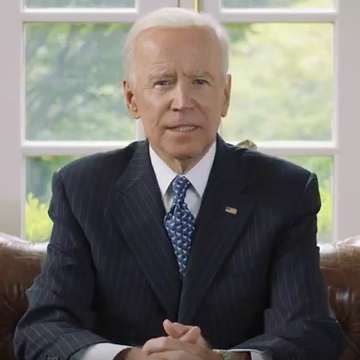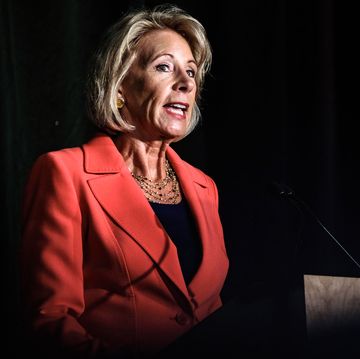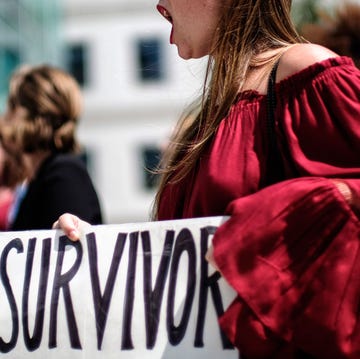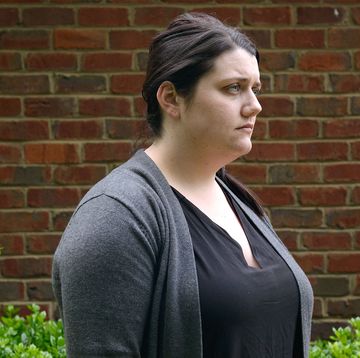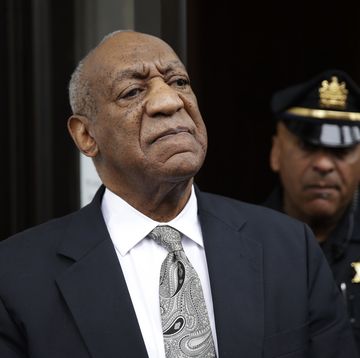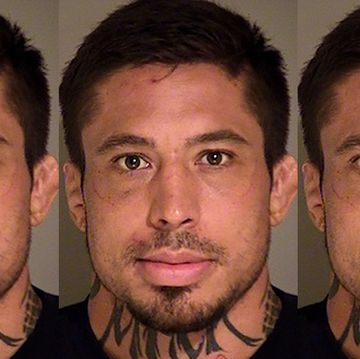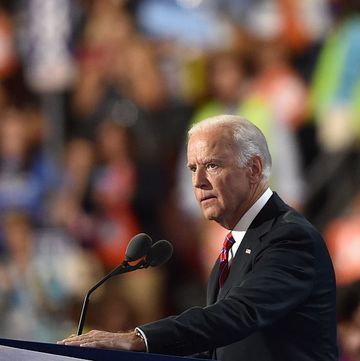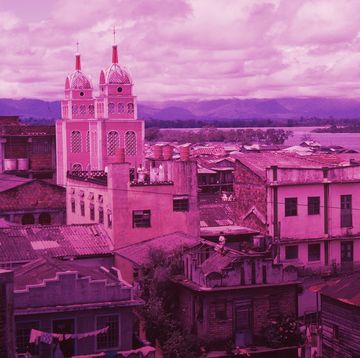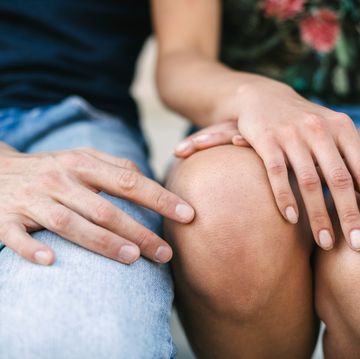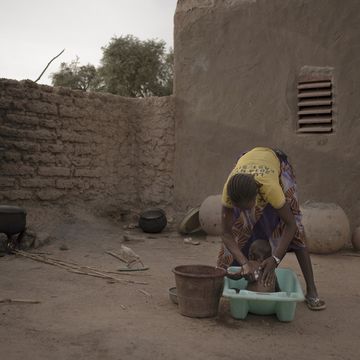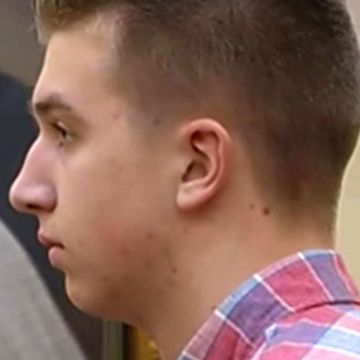Anne Cleary grew up in a wealthy upstate New York suburb, the adored daughter of two hardworking professionals. She was popular, charming and a straight-A student. She was also the victim of sexual abuse beginning at the age of 4. Her abuser was a trusted family member who was often left to care for her. He repeatedly fondled, molested and raped her. No one suspected a thing. Anne made it her job to pretend to be perfect on the outside to hide the fact that she was miserable and lost. She found the strength to push her abuser away when she was 12, but it would be another nine years before she told her secret.
Every year, about 238,000 people become victims of sexual assault, 44 percent of whom are under the age of 18. Now 34, Anne is a sexual abuse counselor with the Women's Center of Jacksonville, and she says she's found purpose helping others cope with the effects of abuse that have consumed her own life. She's now happily married and expecting her first child, and she shares her story so that others may have the courage to tell their own.
The first thing he did was powder my butt, which doesn't sound super sexual. Plenty of little kids get their diapers changed and bottoms powdered, which is exactly why it was so confusing. Progressively, it got worse. He fondled me, and showed me porn, which I certainly didn't understand at such a young age. There was a lot of grabbing and touching — any time I was around. By the time I was 7, it had progressed to oral rape.
While it was happening, I would go limp. Some survivors talk about leaving their bodies — it's called disassociation. I didn't experience that, but I tried to numb myself as much as possible.
As the abuse progressed, he became more bold. It was no longer only behind closed doors. He would assault me when people were in the house — even in the next room. It's like he knew I wasn't going to say anything. He never threatened me not to tell, but I felt trapped. I didn't feel like it would be OK to tell. I felt guilty, and I also felt like I had to protect other people. I was aware from a fairly young age that revealing this abuse would be very painful for other family members. So I kept it a secret.
I did try to hide. The times I did see him, I would put things up against my door so that he couldn't get in or if he came into my room it would make a lot of noise. I wore extra clothes sometimes at night. I did things that were clearly not enough to stop it, but there were attempts to escape and not be left alone with him.
But I was left alone with him a lot. He was this older family member, 10 years older than me, so he could drive me to swim practice, take me to get lunch and babysit when my parents were out. I didn't protest. I was a perfect victim in that regard. I never gave any indication that I was afraid or uncomfortable. I became an award-winning actress to conceal the truth.
My parents were hardworking, very successful and intelligent. They provided me with a wonderful life. There's still a myth that sexual abuse only happens to poor, minority kids or something. That's not true. It affects everyone. My parents were loving and caring parents. And in many other ways were 100 percent there for me. But they weren't in this regard. They didn't see it. They didn't stop it. I hid it very well, but there were many occasions when I just wanted to scream at them, "Do you know what I'm going through?!"
It finally ended when I was 12. I remember every moment of that interaction like it was yesterday. He came into my room, came towards me and I pushed him. I said to him, "Never touch me again, you pervert." And I watched him slowly slink away, like a snake.
I don't know how I did that. Maybe because I was physically stronger or bigger. Maybe I just wasn't willing to take the shame anymore. I don't know, but I'm grateful that I was able to do it.
I spent my early adult years drinking, using drugs and finding any way I could to escape. But around my junior year in college, all the coping mechanisms stopped working. I was depressed. I was overwhelmed. The memories consumed me. I had flashbacks, nightmares and anxiety all the time. The weight of this secret was just getting heavier. I couldn't run from it anymore. I was 21, and I had been living with this secret my whole life.
I couldn't bear to talk to my parents in person, so I wrote them a letter. I was away at college in Philadelphia, and they were in New York. My mother emailed me as soon as she read it. In the letter I asked her not to call. I knew it was going to break my parents' heart. This has been a process of overcoming fear after fear.
They were immediately supportive. I was 21 and started therapy. Two years in, I was diagnosed with PTSD, which helped me in so many ways. It was such a relief to have a description for all the symptoms I had been experiencing. I thought, "So I'm not going crazy. There isn't something defective in me, in my character, and my person." It took a lot of the shame out of it for me.
Shame is one of the greatest lasting effects of abuse. That's how I felt during each assault, after it, and years later when I was trying to cope and recover from it. Shame is such a visceral feeling. It's not just the name of an emotion like anger or sadness. Shame is like a cloak of slime that you wear that you can't get off. It feels dirty. It feels like your fault, like you just know that something's wrong with you.
I never pursued legal action against my abuser, but I am satisfied with the results. My parents immediately confronted him and saw to it that he started seeing a psychologist. He's cut off from the family, so I never have to see him again. He confessed what he had done, and that was good enough for me at the time. It's certainly a lot more than most survivors get.
When I was 26, I was doing very well with my recovery — making good money, working for a good company, putting my degree from a good school to use. But I didn't feel satisfied. On a return visit to my first therapist, she suggested I become a counselor. She said out loud the secret dream I had been fostering for a couple years. I was afraid because it was going to require so much change. But I went for it.
I was 30 when I finished grad school and applied for my first internship. I walked into that interview and told them, "I am an abuse survivor and I really want to work here, and this is the only place I am applying." I just had balls. I got the job and have been here for six years.
My PTSD is gone now, and it's rare that I am even triggered with a bad memory. My husband is the most supportive spouse, and we can't wait to be parents. I have the kind of true happiness I never thought I would have. My recovery makes me feel hope for my clients. I know this experience is extremely painful, but I know they can come out the other side with such incredible gifts.
Anne is joining thousands of survivors in Walk in My Shoes, a 1,500-mile, 42-day trek across the state of Florida led by Lauren's Kids, an organization dedicated to raising awareness of sexual assault and providing support for victims.
RELATED:
10 Domestic Abuse Myths, Debunked
How One Model Overcame the High School Bullies Who Terrorized Her
Follow Heather on Twitter.
Photo credit: Anne Cleary



